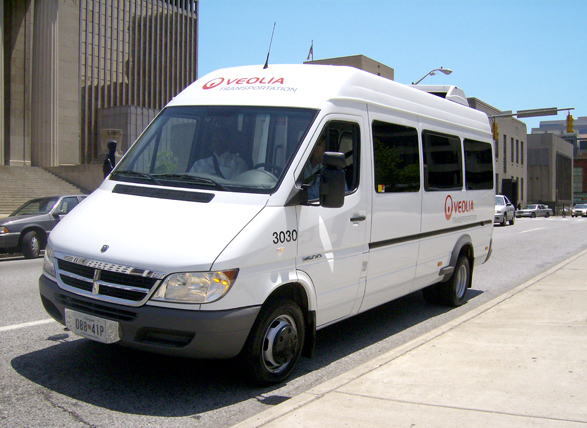Veolia Transportation replaces the fleet and orders more
By David Hubbard

The light went on when Marlon Bates, general manager, paratransit division for Veolia Transportation, Baltimore, MD, noticed major delivery companies replacing fleets with sleek one-piece European styled vehicles promising greater economy and efficiency.
He and his colleagues began scouting out options to also improve fuel economy, maneuverability, service and maintenance for the crucial on-demand paratransit service Veolia Transportation provides to Baltimore City Health Department (BCHD).
To qualify for the Medical Assistance program, potential riders must be BCDH certified with no other source of transportation, or access to anyone else who could be reasonably expected to provide transportation.
The service operates seven days a week, running more than 800 one-way trips a day and offering door-to-door non-emergency medical transportation (NEMT) to qualified medical assistance recipients.
In order to provide the daily service, Veolia Transportation subcontracts some of the work to small businesses, most of which are minority and women owned. In this capacity, Veolia Transportation serves as a broker booking or assigning the trips to pre-approved vendors who provide the service on their behalf. Veolia Transportation’s subcontracted partners perform all non-emergency ambulance/stretcher trips.
Veolia Transportation was proposing a significant change, and Bates and his team knew a switch in vehicles would certainly impact the drivers and mechanics, not to mention the BCHD passengers. The company did not take the process lightly.
“We had been purchasing the same vehicle make for years, and it would have been comfortable to replace vehicles piecemeal with newer models of the same,” he says. “But we saw this as an opportunity to try something different.”
The group gravitated toward Daimler Buses North America and the Dodge Sprinter. In early 2007 Veolia Transportation Baltimore replaced the fleet of 36 vehicles with 29 Dodge Sprinters and noticed an immediate and dramatic decrease in fuel and maintenance costs. The increased capacity of the new vehicles meant the company could purchase seven fewer vehicles than it had in its original fleet, but accommodate the same number of riders. Veolia Transportation has since purchased 13 more Sprinters for the Baltimore fleet, bringing the number to 42.
Running on clean burning biodiesel, the Sprinters average slightly better than 14 miles per gallon against eight miles per gallon with the previous fleet. Daimler Buses North America says the Sprinter vehicles can operate 10,000 miles before a service oil change and 60,000 miles before engine and transmission service. The Dodge Sprinter claims 56 percent less CO2 per vehicle mile than a cutaway vehicle with a Ford 6.0L diesel engine; and 53 percent less than a Ford 6.8L gasoline engine. The OEM recommended interval for oil and filter changes on the Sprinter is every 12,000 miles as opposed to the former 3,000 miles on previous vehicles, which saves on maintenance costs.
Bates also says the narrow body design and tighter turning radius make the vehicles easier to maneuver.
“The new vehicles have actually boosted driver morale,” he says. “Our drivers say they are more comfortable operating the Sprinters, and feel our company has also invested heavily in their safety.”
Prior to putting the vehicles into revenue service, Veolia Transportation Safety and Training Department developed a Sprinter-specific familiarization program.
“We felt we had only one chance to make a positive first impression,” says Bates. “We believed this paid training demonstrated our investment in our people and used it to reinforce our values and commitment to our employees.”
Incurring no expense for the new vehicles, BCHD adds it is important that the vehicles not only be operationally effective, but also well received by customers and promote a positive image for their department as well as the City of Baltimore.
The BCHD Sprinters carry the Veolia Transportation logo and Web site — the first vehicles in the Baltimore fleet to bear the name of the company since Veolia Transportation acquired Yellow Transportation in August 2001. With the Web site posted on the rear of the Sprinters, Bates says the company received a significant spike in inquiries about career opportunities with Veolia Transportation.
Recognizing his effort and leadership to negotiate this change, last year Veolia Transportation honored Bates as the first recipient of its Sustainable Development Award, along with Steve Shaw, Veolia regional vice president for the Northeastern region.
Sustainability is a major priority for Veolia Transportation. Last year the company implemented biofuel in the vast majority of its vehicles with several contracts, and adopted the use of environmentally friendly cleaning products that promote green behaviors in its offices and maintenance shops. BR
